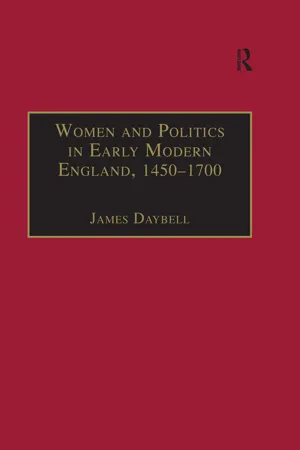
- 288 pages
- English
- ePUB (mobile friendly)
- Available on iOS & Android
Women and Politics in Early Modern England, 1450–1700
About This Book
This collection of essays examines women's involvement in politics in early modern England, as writers, as members of kinship and patronage networks, and as petitioners, intermediaries and patrons. It challenges conventional conceptualizations of female power and influence, defining 'politics' broadly in order to incorporate women excluded from formal, male-dominated state institutions. The chapters embrace a range of interdisciplinary approaches: historical, literary, palaeographic, linguistic and gender based. They deal with a variety of issues related to female intervention within political spheres, including women's rhetorical, persuasive and communicative skills; the production by women of a range of texts that can be termed 'political'; the politicization of marital, family and kinship networks; and female involvement in patronage and court politics. Women and Politics in Early Modern England, 1450-700 also looks at ways in which images of female power and authority were represented within canonical texts, such as Shakespeare's plays and Milton's epic poetry. The volume extends the range of areas and texts for the study of women, gender and politics, and locates women's political, social and cultural activities within the contexts of the family, locality and wider national stage. It argues for a blurring of the boundaries between the traditional categories of the 'public' and the 'private, ' the 'domestic' and the 'political'; and enhances our understanding of the ways in which women exerted political force through informal, intimate and personal, as well as more official, and formal channels of power. As a whole the book makes an important contribution to the reassessment of early modern politics from the perspective of women.
Frequently asked questions
Information
Table of contents
- Cover
- Half Title
- Dedication
- Title
- Copyright
- Contents
- List of Figures
- Notes on Contributors
- Acknowledgements
- List of Abbreviations
- 1 Introduction: Rethinking Women and Politics in Early Modern England
- 2 Sisterhood, Friendship and the Power of English Aristocratic Women, 1450-1550
- 3 A Rhetoric of Requests: Genre and Linguistic Scripts in Elizabethan Women's Suitors' Letters
- 4 Politics in the Elizabethan Privy Chamber: Lady Mary Sidney and Kat Ashley
- 5 Portingale Women and Politics in Late Elizabethan London
- 6 Negotiating Favour: the Letters of Lady Ralegh
- 7 'Suche newes as on the Queries hye wayes we have mett': the News and Intelligence Networks of Elizabeth Talbot, countess of Shrewsbury (c. 1527-1608)
- 8 Esther Inglis and the English Succession Crisis of 1599
- 9 The Cavendish-Talbot Women: Playing a High-Stakes Game
- 10 Aristocratic Women, Power, Patronage and Family Networks at the Jacobean Court, 1603-1625
- 11 Anne of Denmark and the Historical Contextualisation of Shakespeare and Fletcher's Henry VIII
- 12 Mothers, Lovers and Others: Royalist Women
- 13 Beyond Microhistory: the Use of Women's Manuscripts in a Widening Political Arena
- 14 Loyal and Dutiful Subjects: English Nuns and Stuart Politics
- 15 Assuming Gentility: Thomas Middleton, Mary Carleton and Aphra Behn
- Index